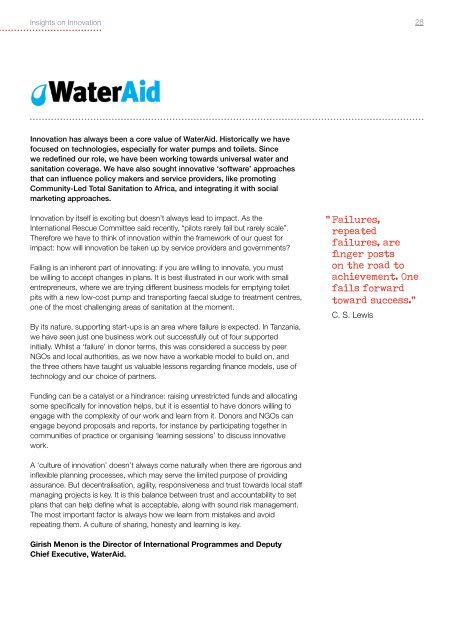O0YQ5
O0YQ5
O0YQ5
Create successful ePaper yourself
Turn your PDF publications into a flip-book with our unique Google optimized e-Paper software.
Insights on Innovation<br />
28<br />
Innovation has always been a core value of WaterAid. Historically we have<br />
focused on technologies, especially for water pumps and toilets. Since<br />
we redefined our role, we have been working towards universal water and<br />
sanitation coverage. We have also sought innovative ‘software’ approaches<br />
that can influence policy makers and service providers, like promoting<br />
Community-Led Total Sanitation to Africa, and integrating it with social<br />
marketing approaches.<br />
Innovation by itself is exciting but doesn’t always lead to impact. As the<br />
International Rescue Committee said recently, “pilots rarely fail but rarely scale”.<br />
Therefore we have to think of innovation within the framework of our quest for<br />
impact: how will innovation be taken up by service providers and governments?<br />
Failing is an inherent part of innovating: if you are willing to innovate, you must<br />
be willing to accept changes in plans. It is best illustrated in our work with small<br />
entrepreneurs, where we are trying different business models for emptying toilet<br />
pits with a new low-cost pump and transporting faecal sludge to treatment centres,<br />
one of the most challenging areas of sanitation at the moment.<br />
By its nature, supporting start-ups is an area where failure is expected. In Tanzania,<br />
we have seen just one business work out successfully out of four supported<br />
initially. Whilst a ‘failure’ in donor terms, this was considered a success by peer<br />
NGOs and local authorities, as we now have a workable model to build on, and<br />
the three others have taught us valuable lessons regarding finance models, use of<br />
technology and our choice of partners.<br />
" Failures,<br />
repeated<br />
failures, are<br />
<br />
on the road to<br />
achievement. One<br />
fails forward<br />
toward success."<br />
C. S. Lewis<br />
Funding can be a catalyst or a hindrance: raising unrestricted funds and allocating<br />
some specifically for innovation helps, but it is essential to have donors willing to<br />
engage with the complexity of our work and learn from it. Donors and NGOs can<br />
engage beyond proposals and reports, for instance by participating together in<br />
communities of practice or organising ‘learning sessions’ to discuss innovative<br />
work.<br />
A ‘culture of innovation’ doesn’t always come naturally when there are rigorous and<br />
inflexible planning processes, which may serve the limited purpose of providing<br />
assurance. But decentralisation, agility, responsiveness and trust towards local staff<br />
managing projects is key. It is this balance between trust and accountability to set<br />
plans that can help define what is acceptable, along with sound risk management.<br />
The most important factor is always how we learn from mistakes and avoid<br />
repeating them. A culture of sharing, honesty and learning is key.<br />
Girish Menon is the Director of International Programmes and Deputy<br />
Chief Executive, WaterAid.


